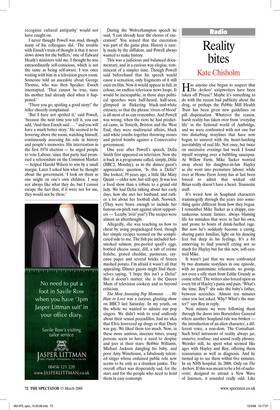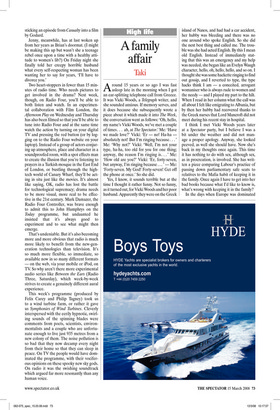Reality bites
Kate Chisholm
Has anyone else begun to suspect that The Archers’ scriptwriters have been taken off Prozac? Maybe it’s something to do with the recent bad publicity about the drug, or perhaps the Pebble Mill Health Trust has been given new guidelines on pill dispensation. Whatever the reason, harsh reality has taken over from ‘everyday life’ in the fictional world of Ambridge, and we were confronted with not one but two disturbing storylines that have now begun to unravel with the heart-lurching inevitability of real life. Not once, but twice on successive evenings last week I found myself weeping over a bubbling saucepan. At Willow Farm, Mike Tucker worried away about his daughter-in-law Hayley as she went into premature labour; while over at Home Farm Jenny has at last been forced to admit that wicked old Brian really doesn’t have a heart. Traumatic stuff.
It’s weird how in Soapland characters transmogrify through the years into something quite different from how they began. I remember Mike Tucker as a chippy, cantankerous tenant farmer, always blaming life for mistakes that were in fact his own, and prone to bouts of drink-fuelled rage. But now he’s suddenly become a caring, sharing pater familias, light on his dancing feet but deep in his feelings. It’s a bit unnerving to find yourself crying not so much for Hayley but for this new, soft-centred Mike.
It wasn’t just that we were confronted by two dramatic storylines in one episode, with no pantomime rehearsals, no gossip, not even a silly stunt from Eddie Grundy as comic relief. The writers also forced upon us every bit of Hayley’s panic and pain. ‘What’s the time, Roy?’ she asks the baby’s father, between screeches. ‘Almost ten minutes since you last asked. Why? What’s the matter?’ says Roy in reply.
Next minute we were following them through the doors into Borsetshire General where another Soapland rule was broken — the introduction of an alien character, a different voice, a non-dom. The Consultant. Such brief intrusions of reality always jar, unnerve, confuse, and sound really phoney. Weirder still, he spent what seemed like ages with Hayley and Roy, offering them reassurance as well as diagnosis. And he turned up to see them within five minutes. In an NHS hospital. In 2008. Only on The Archers. If this was meant to be a bit of radioverité, designed to attract a New Wave of listeners, it sounded really odd. Like sticking an episode from Casualty into a film by Godard.
Jenny, meanwhile, has at last woken up from her years as Brian’s doormat. (I might be making this up but wasn’t she a teenage rebel once upon a time with a healthy attitude to women’s lib?) On Friday night she finally told her creepy horrible husband what every self-respecting woman has been wanting her to say for years, ‘I’ll have to divorce you.’ Two heart-stoppers in fewer than 15 minutes of radio time. Who needs pictures to get involved in the drama? Next week, though, on Radio Four, you’ll be able to both listen and watch. In an experimental collaboration with Film London, the Afternoon Play on Wednesday and Thursday has also been filmed so that you’ll be able to tune into Radio Four and at the same time watch the action by turning on your digital TV and pressing the red button (or by logging on to the Radio Four website on your laptop). Instead of a group of actors conjuring up atmosphere, place and character in a soundproofed room, with a spot effects man to create the illusion that you’re listening to prayers in a Turkish mosque in the East End of London, or bustling through the hightech world of Canary Wharf, they’ll be acting in situ just like the movies. It’s almost like saying, OK, radio has lost the battle for technological supremacy; drama needs to be more visual, more real to be effective in the 21st century. Mark Damazer, the Radio Four Controller, was brave enough to admit this to John Humphrys on the Today programme, but undaunted he insisted that it’s always good to experiment and to see what might then emerge.
That’s undeniable. But it’s also becoming more and more obvious that radio is much more likely to benefit from the new-generation technologies than television. It’s so much more flexible, so immediate, so available now in so many different formats — on the web, via your mobile or iPod, on TV. So why aren’t there more experimental audio series like Between the Ears (Radio Three, Saturday), which week-by-week strives to create a genuinely different aural experience.
This week’s programme (produced by Felix Carey and Philip Tagney) took us to a wind turbine farm, or rather it gave us Symphonies of Wind Turbines. Cleverly interspersed with the eerily hypnotic, swirling sounds of the spinning blades were comments from poets, scientists, environmentalists and a couple who are unfortunate enough to live just 935 metres from a new colony of them. The noise pollution is so bad that they now decamp every night from their home so that they can sleep in peace. On TV the people would have dominated the programme, with their vociferous opinions on these spooky new sky gods. On radio it was the swishing soundtrack which argued far more resonantly than any human voice.



























































































 Previous page
Previous page